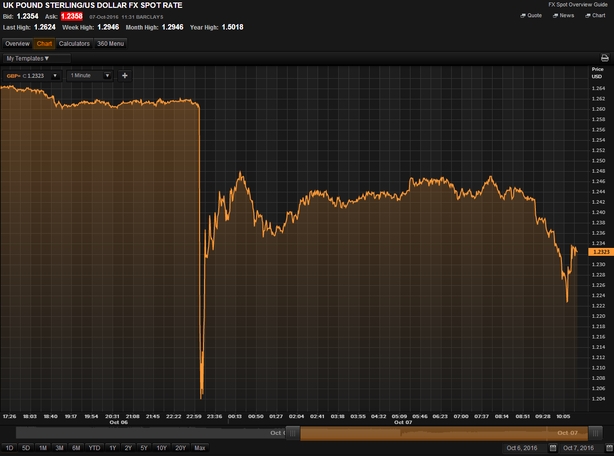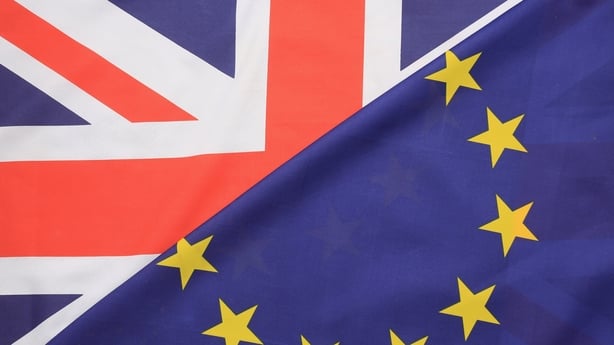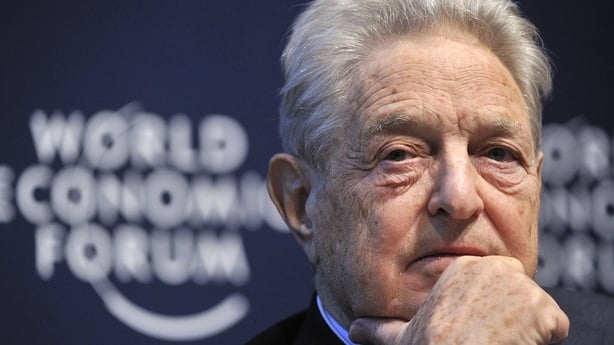Sterling lost a tenth of its value in just minutes overnight, in what traders said was a "flash crash" driven by computer-initiated sell orders that left the pound at a fresh 31-year-low and heading for its worst week since January 2009.
The pound has been under pressure for most of this week as anxiety grows that Britain will opt for a "hard" exit from the European Union.
It dived about 10% from levels around $1.26 to $1.1378 in a matter of minutes in thin early Asian trade.

That low was later revised to $1.1491 - still the weakest level for sterling since 1985 - by Thomson Reuters, which owns the Reuters foreign exchange brokerage platform RTSL and said an outlying trade had been cancelled.
Sterling recovered from the steep falls and was worth $1.2275 in later trade, still down 2.7% on the day.
The euro also rose to 94.03 pence, its highest since early 2009, before easing to 89.69 in late afternoon trade.
The Bank of England said it was "looking into" the flash crash that sent sterling plunging overnight.
The drop in Asia came after French President Francois Hollande said the EU needed to remain firm with Britain, after it appeared Prime Minister Theresa May had opted for a tougher exit from Europe.
The hardline stance from both parties left investors fretting about the pound's future.
Global markets have been on edge in recent days on worries about how Britain will exit the EU and about May's comments on loose monetary policy, which some saw as a thinly veiled attack on the Bank of England.
Many investors think May's government is leaning towards a hard Brexit, where Britain gives up full access to the single market in order to impose full control on its borders.

Some fear that could hinder trade and constrict the foreign investment needed to fund Britain's huge current account deficit, one of the biggest in the developed world.
HSBC today said it was forecasting the pound to drop to $1.10 and parity against the euro by the end of 2017.
"The pound used to be a relatively simple currency that used to trade on cyclical events and data, but now it has become a political and structural currency. This is a recipe for weakness given Britain's twin (budget and current account) deficits," HSBC's global head of FX research David Bloom said.
Sterling is set for a weekly loss of 5.4%, trading below the psychological $1.25 mark and removing various technical support levels on the move lower, spooking traders, including computer-driven algorithms.
"Once the pound started moving lower, then more technical algos could have followed suit, compounding the short, sharp, selling pressure," said Kathleen Brooks, research director at City Index.
"Thus, the pound has been the victim of the digital, headline-driven world that we live in. For sterling, algorithms have become the modern-day version of a George Soros."

Billionaire Soros earned fame in 1992 by betting against the pound, which was eventually forced out of the European Exchange Rate Mechanism and sharply devalued on "Black Wednesday".
Earlier this year, the South African rand suffered a similar plunge and analysts said the sharp drop in sterling will do nothing for confidence in a market that has seen volumes drop as tougher regulations for banks, traditionally the dominant force, bite and curtail trading by humans.
The weakness in the British pound also helped support the dollar before US jobs data later today.
Algorithmic trading computers blamed for sterling's 'flash crash'

